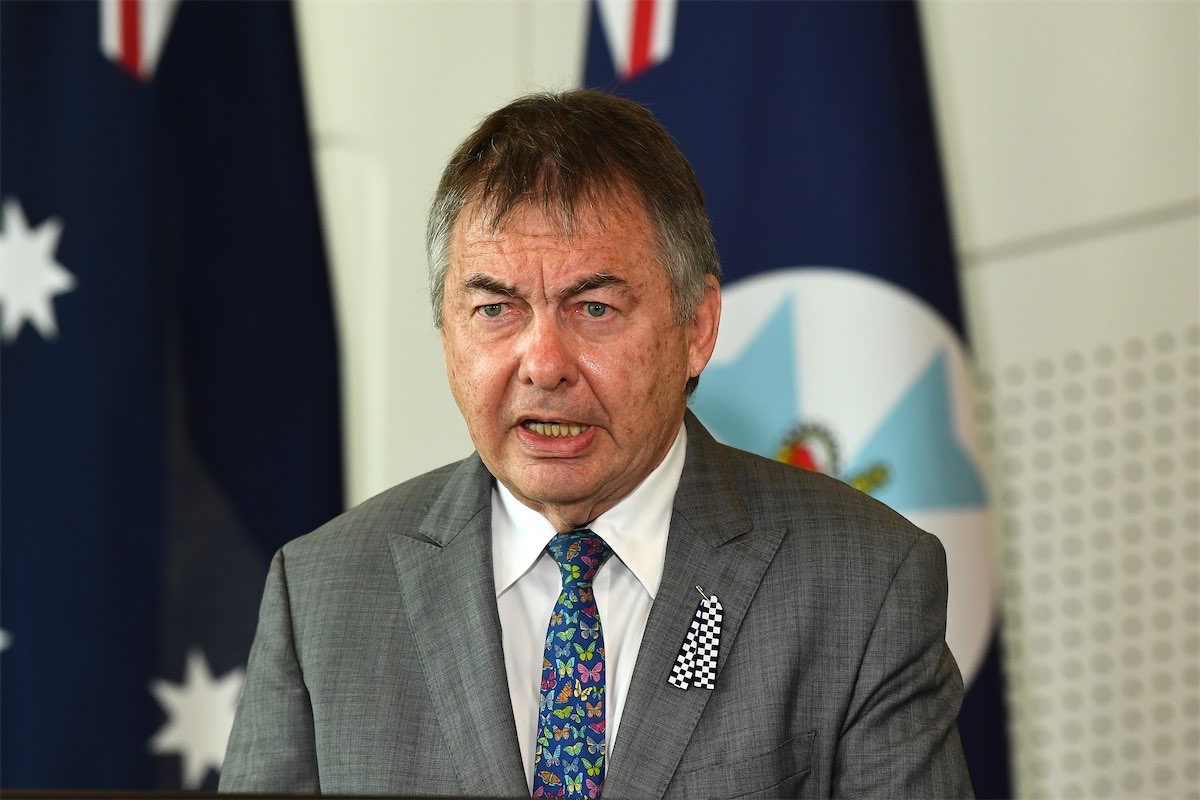
“The police told the DPP that there was insufficient evidence. He didn’t agree. Then he complained loudly about the police when he didn’t get the conviction,” legal columnist HUGH SELBY previews the Sofronoff Inquiry.”
IT’S now four years since something did or didn’t happen between two parliamentary staffers on the hill.

Events since, culminating in the Sofronoff Inquiry, which begins its public hearings on May 1, have included:
- media beat ups,
- police frustrated in their investigation,
- unexpected conduct by our director of public prosecutions and the victims of crime commissioner,
- delays to the trial, a late search for defence counsel,
- a deadlocked jury,
- the finding of material in the jury room that meant that the jury had to be discharged,
- claims that the complainant was so mentally distressed that a retrial was impossible,
- a formal complaint by the DPP about alleged police conduct,
- the ACT opposition demanding an inquiry,
- the ACT government gleefully agreeing to have an inquiry,
- repeated claims by mainstream media that the complainant (despite her illness) and the Albanese government negotiated a several million dollars payout to her but with both sides giving neither confirmation nor justification,
- and – most recently – the acquitted accused taking multiple defamation actions.
The Commissioner, Walter Sofronoff KC, and his team come from Queensland. His most recent success was his inquiry into shortcomings within parts of the Queensland Forensic Science Service. More details of his successful career and his strong interest in fast cars can be found on the inquiry website.
The issues before the inquiry are:
- Whether any police officers acted wrongly: a)in their investigation of Ms Higgins’ allegations; b)in their dealings with the Director of Public Prosecutions [Shane Drumgold SC] in relation to the criminal proceedings against Mr [Bruce]Lehrmann; c) in their dealings with the lawyers for the defence before, during or after the trial; d) in their provision of information to anyone about this criminal case;
- If any police officers so acted, their reasons and motives for their actions;
- Whether Mr Drumgold acted wrongly;
- If Mr Drumgold so acted, his reasons and motives for his actions;
- Mr Drumgold’s post trial letter of complaint to the police;
- Whether the Victims of Crime Commissioner [Heidi Yates] followed the law in support provided to Ms [Brittany] Higgins; and,
- Any issues that are closely related to those issues.
To better understand what benefits this inquiry may bring to our local criminal justice system this article comments upon some aspects of current practice.
Relationship between police and prosecutors
The working relationship anywhere between police and prosecutors is inherently tense for various reasons including:
- Because the prosecutors who are desk bound are criticising the field work of police investigators. For example, is the evidence collected by police complete? Is the evidence credible? If not, can credible evidence be provided by someone else? Why isn’t such and such included in the materials provided by police to the prosecutors?
- Many police feel that prosecutors should be more appreciative of police efforts and better prepared when it comes to hearings. Police feel that they are sacrificed in the witness box when it is the prosecutor who should be taking the heat.
- Police, prosecutors, defence lawyers and judicial officers are all likely to underestimate the work demands and stresses placed on each other. This can lead to a blame game, both in and out of court.
This is the inquiry we had to have when we didn’t need to have one at all – the basic issues and their resolution are obvious: prosecutions start with a presumption of innocence and must be based on sufficient evidence that there are reasonable prospects that a jury, considering all the facts and following the judge’s instructions as to the law, will convict.
The police told Mr Drumgold that there was insufficient evidence. He didn’t agree. Then he complained loudly about the police when he didn’t get the conviction.
Instead, he got a jury that was discharged because someone was naughty and careless, but only after the jury had told the trial judge it was deadlocked. Worse for him and her, he and Ms Higgins then found that because she did not give her evidence from a remote room that there was a gap in the law: she’d have to give her evidence a second time if there was a retrial. That meant she would be cross-examined a second time, when the defence would reap all possible benefit from how she had answered questions at the first trial.
Not all complainants are victims
Actions have consequences. Repeated over-egging of the assumed validity of complaints about sexual misadventure has changed the environment in which not only the public but also media, police, lawyers and jurors deal with these allegations.
Human beings, that’s all of us, exaggerate, lie, confabulate, forget, and mis-remember. Investigators, prosecutor assessment of whether to go to trial, defence lawyers, and trial fact finders must all acknowledge the inevitability of these behaviours.
It follows – despite shrill calls to the contrary – that complainants are only that until it has been proved that they are the victim of a crime.
When someone is assaulted or robbed in a public space then their “victim” status is on display. That is not so when a person alleges that they were forced into an unwanted sexual act in a private place where only the two parties were present. Forensic evidence can confirm sexual activity and often with whom it took place; however, it rarely shows consent or non-consent.
Many readers will recall that Victims of Crime Commissioner Heidi Yates chose to be closely associated with the complainant Brittany Higgins, so closely that she presented as the Complainant’s Commissioner. Despite the Barr government setting up this inquiry and including her conduct in the terms of reference, it then renewed her statutory appointment instead of giving her an acting appointment until the results of the Sofronoff Inquiry were known.
Information that may lead to necessary change
What may make this inquiry truly useful is the information that it gathers and its analysis of that information for our future investigations and trials.
The inquiry team has been busy interviewing people about their roles and performances as players in our criminal justice system. This gives hope that the final report will make recommendations that will lead to changes in how the police are to investigate complaints about alleged sexual assault, the way that decisions about prosecutions are made (both for a first and any subsequent trial) and interactions between investigating police and defence lawyers.
I note that Mr Whybrow SC, who appeared for Lehrmann, and recently for an accused following a rape allegation by a “friend with benefits”, is reported as having said, after his client was very quickly acquitted by the jury, that the case should never have gone to trial. It was more than a little telling that there had been sexual events following the alleged rape – with no complaint. This is not the only case in which the ACT DPP has chosen to go to trial (and retrial) in the face of other conduct by the complainant which is incompatible with “forced” sex.
Given that the High Court, when overturning the convictions of the now late Cardinal Pell, made it quite clear that viable “alternate hypotheses” make beyond reasonable doubt impossible, it is surprising several years later that this lesson remains unlearned in Canberra – at least among some in the office of the ACT DPP.
With or without an inquiry things need to change
Here are 10 suggestions towards putting things right:
- Stop telling complainants that they are believed. They should be told the truth – that perspectives change a story, but that their account will be assumed to be an honest recollection until there is credible evidence to the contrary.
- Stop bleating incessantly about the failure to get convictions while accepting uncritically every complainant’s story. Strive to strike a balance and pay proper attention to how court proceedings are destructive and incapacitating to acquitted accused.
- Believability is a critical component in sexual assault cases. If new evidence going to that believability – such as showing that the complainant has selectively deleted text messages that don’t match their story to police – comes to light, then calling the complainant back for further cross examination should be a right, not something for which the accused has to beg and which can be refused by a judicial wave of the discretionary hand.
- Revisit the use of “pretext calls”. This is where the complainant phones the alleged “sexual abuser” to gain “admissions” of improper conduct. These calls are recorded by police and then used in evidence against the accused. They are grossly lopsided.
- Accept the certainty that jurors will search the web and deal with that reality, instead of “do not do this and do not do that”.
- Stop the judicial error of including in judge-alone decisions: “You are acquitted because the prosecution has failed to prove its case but I know you did it because you are a nasty piece of work and the complainant is ever so sweet and vulnerable”. This form of character assassination has no place in our criminal law and it is an abuse of power. What’s more, there is no way to correct it.
- Make DPP decisions to go or not to go trial reviewable. They are immune from review. That may have been good practice when the attorney-general “signed” indictments. It is not good practice now because it encourages the laxness seen in ACT prosecutions. When there is to be a retrial then fairness demands external review.
- If, alas, the DPP is to stay immune from a review of decisions to go to trial then allow an acquitted accused to get their legal costs from the prosecution – at the discretion of the trial judge.
- Make Victim Impact statements something more than “window dressing” in sentencing proceedings.
- Implement “restorative justice” principles as the preferred “response” in most “sexual assault” cases. “Serial rapists” are the exception, not the norm. So many sexual assault cases reflect two substance-affected people behaving badly, but only one faces years in jail. Give both parties the opportunity to reassert their dignity in a moderated, private space. Allow for binding outcomes – including compensation – to be reached between the parties where nothing said or written in that process – apart from the agreement – can be used by either party if the matter goes to any court – criminal or civil – thereafter.
Hugh Selby is the “CityNews” legal affairs commentator. His free podcasts on “Witness Essentials” and “Advocacy in court: preparation and performance” can be heard on the best known podcast sites.
Who can be trusted?
In a world of spin and confusion, there’s never been a more important time to support independent journalism in Canberra.
If you trust our work online and want to enforce the power of independent voices, I invite you to make a small contribution.
Every dollar of support is invested back into our journalism to help keep citynews.com.au strong and free.
Thank you,
Ian Meikle, editor





Leave a Reply